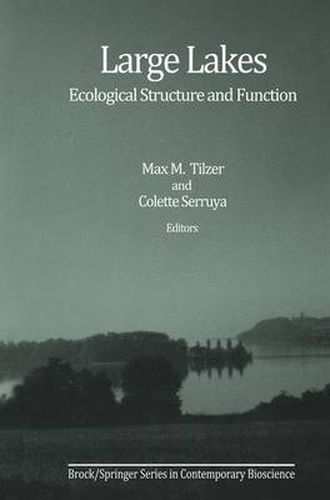Readings Newsletter
Become a Readings Member to make your shopping experience even easier.
Sign in or sign up for free!
You’re not far away from qualifying for FREE standard shipping within Australia
You’ve qualified for FREE standard shipping within Australia
The cart is loading…






This title is printed to order. This book may have been self-published. If so, we cannot guarantee the quality of the content. In the main most books will have gone through the editing process however some may not. We therefore suggest that you be aware of this before ordering this book. If in doubt check either the author or publisher’s details as we are unable to accept any returns unless they are faulty. Please contact us if you have any questions.
The vast majority of the world’s lakes are small in size and short lived in geological terms. Only 253 of the thousands of lakes on this planet have surface areas larger than 500 square kilometers. At first sight, this statistic would seem to indicate that large lakes are relatively unimportant on a global scale; in fact, however, large lakes contain the bulk of the liquid surface freshwater of the earth. Just Lake Baikal and the Laurentian Great Lakes alone contain more than 38% of the world’s total liquid freshwater. Thus, the large lakes of the world accentuate an important feature of the earth’s freshwater reserves-its extremely irregular distribution. The energy crisis of the 1970s and 1980s made us aware of the fact that we live on a spaceship with finite, that is, exhaustible resources. On the other hand, the energy crisis led to an overemphasis on all the issues concerning energy supply and all the problems connected with producing new energy. The energy crisis also led us to ignore strong evidence suggesting that water of appropriate quality to be used as a resouce will be used up more quickly than energy will. Although in principle water is a renewable resource, the world’s water reserves are diminishing in two fashions, the effects of which are multiplicative: enhanced consumption and accelerated degradation of quality.
$9.00 standard shipping within Australia
FREE standard shipping within Australia for orders over $100.00
Express & International shipping calculated at checkout
This title is printed to order. This book may have been self-published. If so, we cannot guarantee the quality of the content. In the main most books will have gone through the editing process however some may not. We therefore suggest that you be aware of this before ordering this book. If in doubt check either the author or publisher’s details as we are unable to accept any returns unless they are faulty. Please contact us if you have any questions.
The vast majority of the world’s lakes are small in size and short lived in geological terms. Only 253 of the thousands of lakes on this planet have surface areas larger than 500 square kilometers. At first sight, this statistic would seem to indicate that large lakes are relatively unimportant on a global scale; in fact, however, large lakes contain the bulk of the liquid surface freshwater of the earth. Just Lake Baikal and the Laurentian Great Lakes alone contain more than 38% of the world’s total liquid freshwater. Thus, the large lakes of the world accentuate an important feature of the earth’s freshwater reserves-its extremely irregular distribution. The energy crisis of the 1970s and 1980s made us aware of the fact that we live on a spaceship with finite, that is, exhaustible resources. On the other hand, the energy crisis led to an overemphasis on all the issues concerning energy supply and all the problems connected with producing new energy. The energy crisis also led us to ignore strong evidence suggesting that water of appropriate quality to be used as a resouce will be used up more quickly than energy will. Although in principle water is a renewable resource, the world’s water reserves are diminishing in two fashions, the effects of which are multiplicative: enhanced consumption and accelerated degradation of quality.